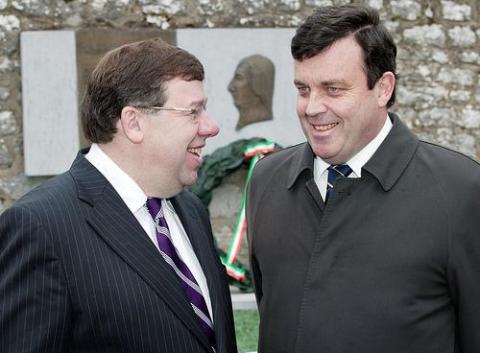September 30, 2008: a day of deference

Contrary to the narrative we are often told, warnings were given. They were simply not listened to. By Vincent Browne.
On January 24, 2008, a confidential paper was circulated within the Department of Finance, addressing the issue of the stability of Ireland’s financial institutions.
It was a prescient overview of the then and future state of Irish financial institutions. While it expressed a then-familiar confidence in the solvency of those institutions, it foresaw grave problems ahead.
It observed that there was a perception in financial markets that Irish banks were overexposed to the vagaries of the property market and this could cause a crisis.
Incidentally, while on several occasions the anxieties of the financial markets over the banks’ vulnerability to the property market are mentioned in the papers released by the Committee of Public Accounts last Friday, anxieties on the part of the Irish regulatory authorities to the very same phenomenon were entirely absent.
Among the possible responses to a financial crisis which the paper considered was the appointment of an examiner to one or more banks.
It noted: ‘‘In the case of a credit institution, court protection [examinership] would offer a number of advantages.
While it would freeze the company’s transactions, the examiner can be given extensive powers to continue its operations, pending the putting in place of the final rescue package.” On February 8, 2008, there was a PowerPoint demonstration within the Department of Finance on an overview of Financial Stability and Resolution Issues.
It stated bluntly: ‘‘As a matter of public policy to protect the interests of taxpayers any requirement to provide open ended/ legally-binding state guarantees which would expose the exchequer to the risk of very significant costs are not regarded as part of the toolkit for successful crisis management and resolution’’.
It did go on to concede that there may arise circumstances where such guarantees would be unavoidable ‘‘to maintain confidence in the overall financial system’’.
On May 8, 2008, the day after he was appointed Minister for Finance, Brian Lenihan was presented by his department with a document: Briefing on Financial Stability Issues.
It stated: ‘‘The Irish banking system is sound and robust based on all the key indicators of financial health’’.
But, it continued: ‘‘International sentiment towards the Irish banks is very negative on account of the assessment that the pronounced downturn in the Irish market will undermine their financial position... A domestic shock [for example, failure of a major property developer or very sharp further falls in property prices] would have a major negative effect on the financial position of the Irish banks on a systemic basis.”
Lenihan received a further note on May 21, 2008, this one recording a meeting by departmental officials with Michael Somers, then head of the National Management Treasury Agency (NTMA), the agency that managed Irish debt, borrowed billions abroad and managed the pension reserve fund.
From early in 2007, Michael Somers had stopped depositing funds with Anglo Irish Bank because he thought it was likely to collapse, but he appears not to have communicated this opinion at this meeting, or at least the note of the meeting does not record that.
It does say: ‘‘The NTMA has placed some deposits with the main banks.” Did they not ask him why only ‘‘some’’ deposits, since at any one time the NTMA would have been placing billions, sometimes tens of billions, on deposits with various financial institutions?
Very curious that.
The pressure started to mount in September 2008. The financial markets were very nervous about Irish banks because of the decline in property values and the exposure of the Irish banks to property loans.
As a consequence of all this, government bonds were standing at 47 basis points over German bonds, whereas normally the spread was in the five to ten range.
On September 18, the reality of an unfolding crisis was becoming apparent. Irish Nationwide was in crisis and seeking state support. Irish Life & Permanent was also facing difficulties, as was Anglo Irish Bank, in spite of its defiant optimism, as expressed in a presentation to the department a few weeks before the apocalypse.
Merrill Lynch was commissioned to advise the government and strongly recommended against a blanket guarantee to the banks. It said such a guarantee ‘‘would almost certainly negatively impact the state’s sovereign credit rating and raise issues as to its credibility’’ - this was because everyone would know the Irish state could not possibly fund a guarantee of almost €500 billion, if it came to it.
But, undaunted, the blanket guarantee was given on September 30.
What I find surprising about all this is the following: How was it that the option of examinership, which was canvassed at the beginning of 2008, was never considered when the crisis broke?
The banks could have continued to function, with modest support, and some of them could have been wound down in an orderly manner without disruption to the economy.
Why, at no stage, does it appear that the potential cost to this society of a bank bailout was thought through in the discussions that led to the guarantee?
It is as though society did not matter, that the social consequences in terms of health, education, welfare and employment didn’t matter, or at least didn’t feature.
Deference to the financial markets did feature, however.
Big time.
